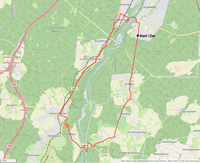Contents
| Men's cycling road race at the Games of the XX Olympiad | ||||||||||
|---|---|---|---|---|---|---|---|---|---|---|
 The course | ||||||||||
| Venue | Munich, West Germany | |||||||||
| Date | 7 September 1972 | |||||||||
| Competitors | 163 from 48 nations | |||||||||
| Winning time | 4:14:37 | |||||||||
| Medalists | ||||||||||
| ||||||||||
| Cycling at the 1972 Summer Olympics | |
|---|---|
| Road cycling | |
| Road race | men |
| Team time trial | men |
| Track cycling | |
| Track time trial | men |
| Individual pursuit | men |
| Team pursuit | men |
| Sprint | men |
| Tandem | men |
In cycling at the 1972 Summer Olympics, the men's individual road race was held on 7 September. There were 163 starters from 48 nations. [1] The maximum per NOC was four. A total of 76 cyclists finished the race. The event was won by Hennie Kuiper of the Netherlands, the nation's first victory in the men's individual road race and first medal in the event since 1948. Clyde Sefton earned Australia's first medal in the event with his silver. Jaime Huélamo of Spain finished third, but was disqualified after failing a drug test; the medal was not reassigned. [2] [3] Italy missed the podium, breaking a four-Games streak of gold and silver medals.